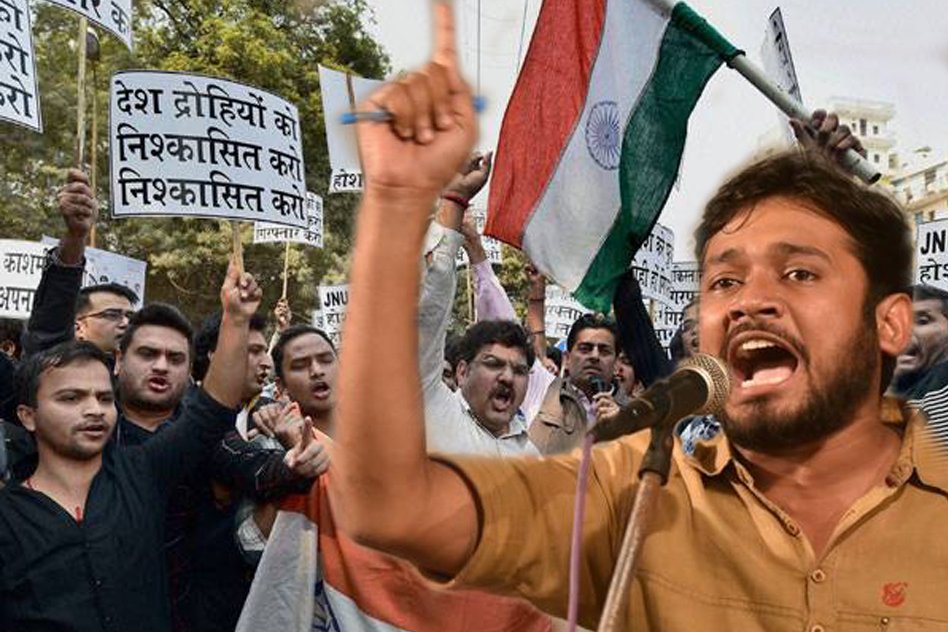Image Source: The Hindu & India Today
Over the past few days, we received a lot of emails and messages from our community members for The Logical Indian’s coverage on JNU. As a responsible alternate-media portal, we believe in covering the complete picture of a news and present it with the most rational and genuine opinion. In order to achieve this, we wait for considerable amount of time to observe the developments in the news story and provide our community members an overall perspective on the news.
Sequence of Events at Jawaharlal Nehru University
■ A group of students on Tuesday held an event on the JNU campus attended by representatives from most of JNU’s political outfits. The event, titled “The Country Without a Post Office”, had been organised to “stand in solidarity with the struggle of the Kashmiri people for their democratic right to self-determination” and, among other things, to protest the ‘judicial killing’ of Afzal Guru, who was hanged in 2013 after being convicted in the attack on Parliament in 2001. This comes a day after Guru’s third death anniversary.
It soon turned into a scuffle between the ABVP and the Left organisations after the slogans were shouted. Some students present said that the slogans included, “Bharat ke tukde honge hazaar” (India will be broken into a thousand pieces) and “Bharat ki Barbadi tak jung zaari rahegi” (Our fight will continue until India is destroyed).
■ The event occurred despite varsity administration having cancelled the permission following a complaint by ABVP members, who termed the activity as anti-national. The university administration said that it had been misled all through since the organisers had asked for permission for a “cultural programme”.
■ The JNU Student Union, as well as a number of Leftist campus outfits, had actually condemned the allegedly divisive slogans chanted at that event. The JNU administration has already instituted a disciplinary enquiry as to how the event took place despite the withdrawal of permission and said it will wait for the probe report before taking any further action.
■ JNU students union president Kanhaiya Kumar was arrested on Friday in connection with a case of sedition and criminal conspiracy. The police told the court that Kanhaiya was also required to be interrogated for the purpose of identification of other accused who were seen shouting anti-national slogans during the event organised in the Jawaharlal Nehru University (JNU) Campus on February 9.
■ The Left-inclined Students Federation Of India (SFI) have distanced themselves from the protest.
■ Rajnath Singh & Smriti Irani have conveyed there will be “zero tolerance” towards anti-national activities.
■ There has been a widespread debate in the Social Media over the issue. Many terms the incident as “anti-national” while some have termed it as “stifling of dissent”.
Q: Why Would Anyone Raise a Voice in Support of a Terrorist?
The group of people who are raising their voice have confirmed that they not in support of Afzal Guru, rather they are raising their voice against the process of “Judicial Killing”.
Looking Back:
On 3 February 2013, Afzal Guru( Prime convict for December 2001 terrorist attack on the Indian Parliament) was secretly hanged at Delhi’s Tihar Jail around 08:00 am on 9 February 2013 and afterward buried inside jail grounds. His family was not informed prior to execution and his dead body was later denied to his family. Guru’s family was informed of his execution two days after by a letter.
The prison took steps to execute Guru in secrecy. The execution was carried out without the family’s knowledge or any form of public announcement. Guru’s body was buried on prison grounds to prevent a public funeral.
Many legal experts and international human rights group including Amnesty International condemned the secret process of execution saying that it indicates a disturbing and regressive trend towards executions shrouded in secrecy. The operation surrounding the execution of Afzal Guru was code named Operation Three Star.
The event at JNU titled “The Country Without a Post Office”, had been organised to protest this judicial killing of Afzal Guru as per reports available in various news portals.
At the same time, Supreme Court’s Judgement on Appeal by Guru on August 5, 2005 says, “As criminal acts took place pursuant to the conspiracy, the appellant, as a party to the conspiracy, shall be deemed to have abetted the offence. In fact, he took active part in a series of steps taken to pursue the objective of conspiracy.”
The Logical Take:
In a democracy, everyone has the freedom of expression. Undoubtedly, freedom of speech and expression comes with responsibility. If few students from JNU had decided to express their disagreement on the Judicial Killing by organizing a discussion/event, this is still acceptable. What went wrong for JNU and is not at all acceptable is the anti-national (destructive) slogans shouted such as “Bharat ke tukde honge hazaar” (India will be broken into a thousand pieces) “Bharat ki barbadi tak jung zaari rahegi” (Our fight will continue until India is destroyed).
It is evident that the sloganeering against India will hurt the collective conscience of the nation and The Logical Indian strongly condemns any destructive slogans/speech against the country by any individual or public representative.
– No matter which country we belong, we should remain grateful to the country we live in. Every country has some issues, you fight until it gets “fixed” and not until it gets “destroyed”.
We also request the investigating authorities to precisely identify the ones who made anti-national comments and ensure proper legal actions. The students given their time and energy could better use their time and resources to raise their voice on more important issues which are faced by more than a billion people across our country. Kudos to the central government in acting quickly and effectively against dissenting voices.
What Could Be The Way Forward?
Let’s face it, JNU is a university within which multiple student organisations are present. It is a prestigious institute known to be a bastion of free speech. The protestors were too minuscule to be even considered as a sane voice to be emulated. ABVP, BJP, the media and the social media could have ignored a protest which was that small. Too often we let small protests like these cloud our imagination and mix up our priorities. We have issues facing in our countries which demand our immediate attention. As vigil citizens of a democracy let us be on our toes, stick together, work and demand for the development of our country.
Here are two suggestions from The Logical Indian, acting on which such incidents in future can be well avoided –
1) Precautionary – IIT Madras recently issued a circular that bans political activities in the campus. One might not agree but certainly something to ponder given the way small political activities tend to spoil the sanctity of an institute which are pillars of India’s development. Such “political groups” in colleges campuses could be derecognised.
2.) Reactionary – The media could avoid protests within the campus, what happens within the campus could be left to the campus unless there are any signs of scuffle snowballing into riots or property damage and loss of lives.
The Logical Indian within its limits of freedom of speech and as a responsible alternate-media portal condemns the anti-national sloganeering. As a nation, we should create platforms for constructive debates where all voices could be placed, heard, responded and condemned. Let us move forward from protests to discussions and solving problems











